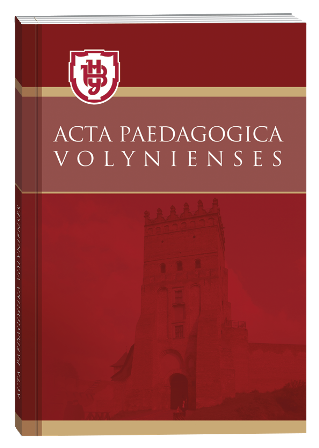DEVELOPMENT OF MENTAL ACTIVITY OF PRIMARY SCHOOL STUDENTS IN DIDACTIC GAME
DOI:
https://doi.org/10.32782/apv/2023.3.9Keywords:
primary school, development, mental activity, didactic game.Abstract
The pedagogical conditions of mental activity development of primary school students in didactic game are revealed, theoretically substantiated and experimentally checked in scientific work. The search for new psychological and pedagogical approaches to the development of children`s mental activity in younger school age is becoming increasingly important, because the activity of the mind is one of the fundamental properties of personality. The mental upbringing and development of the children is not only giving them knowledge, but also teaching how to use this knowledge in a variety of activities. The article analyzes the theoretical patterns, formation and development of younger school age children`s mental activity by means of didactic games. The leading pedagogical conditions of using didactic games as a means of developing mental activity are identified and substantiated. An important factor in solving the research problem is the systematic use of didactic games in the educational process of primary school. The content of the younger school age children`s educational process includes the mental activity education, the development of intellectual skills, imagination, perception, memory, thinking, curiosity and mental abilities. First of all, education of mental activity – it is the development of primary school students’ active mental activity. The use of didactic games, in which two principles operate simultaneously: educational (cognitive) and game (interesting), is due to the need to mitigate the transition from one leading activity to another, as well as the fact that during the game children learn more easily, gain idea of the world around. The essence of the using didactic games method in the mental education process of children of younger school age is that they consistently expand their understanding of the environment individual objects`, form logical thinking, the ability to analyze, classify and compare. The leading form of work is the daily communication of the educator with the children using the material of didactic games. The developed method of using didactic games as a means of developing mental activity requires compliance with a number of pedagogical conditions, including: the use of didactic games in the process of communicating with children in various activities in the context of solving problems of mental education; the use of clarity in the process of working with didactic games, a clear organizational structure of the educational process.
References
Божук С. Психолого-педагогічні умови розвитку пізнавального інтересу молодших школярів. Актуальні питання дошкільної та початкової освіти. 2019. №. 2. С. 124–127.
Бондарчук Н. Активізація пізнавальної діяльності молодших школярів Вісн. Житомир. держ. ун-ту. 2018. № 41. С. 103–106.
Воробйова С. Дидактична гра в процесі навчання. Рідна школа. 2002. №10. С. 46–48.
Державний стандарт початкової освіти / затв. постановою Кабінетом Міністрів України від 21.02.2018 № 87 зі змінами. URL: https://zakon.rada. gov.ua/laws/show/87-2018-%D0%BF#Text
Довгаль О. Г. Розвиток пізнавальної активності дітей молодшого шкільного віку в різних видах діяльності. Інститут проблем виховання АПН України. Київ, 2019. С. 58–64.
Жорник О. Формування пізнавальної активності учнів у процесі спільної ігрової діяльності. Рідна школа. 2000. № 2. С. 26–28.
Курик М. Формування пізнавальної активності школярів через сюжетнорольові та дидактичні ігри. Гірська школа Українських Карпат : наук.-метод. журн. / Прикарпат. нац. ун-т ім. В. Стефаника. Івано-Франківськ, 2016. № 14. С. 240–242.
Куліш Н.В. Застосування дидактичних ігор у навчальному процесі Нові технології навчання : наук.-метод. зб. / Ред. кол. : В. Д. Зайчук (головний редактор), О. Я. Савченко, М. Ф. Дмитриченко. Київ : НМЦ ВО, 2002. Вип. 33. С. 174–175.
Нікітіна Н. Активізація пізнавальної активності учнів шляхомвикористання ігрових моментів та цікавих завдань.Початкове навчання та виховання. 2011. № 31. С. 21–31.
Руденко О. Використання гри як засобу підвищення ефективності навчання. Школа : інформаційно-методичний журнал. 2011. № 11. С. 67–70.
Сидоренко М. М. Розвиток пізнавальної активності учнів засобами дидактичної гри. Наукові записки Ніжинського державного університету ім. Миколи Гоголя. Психолого-педагогічні науки. Ніжин, 2014. № 5. С. 115–119.







